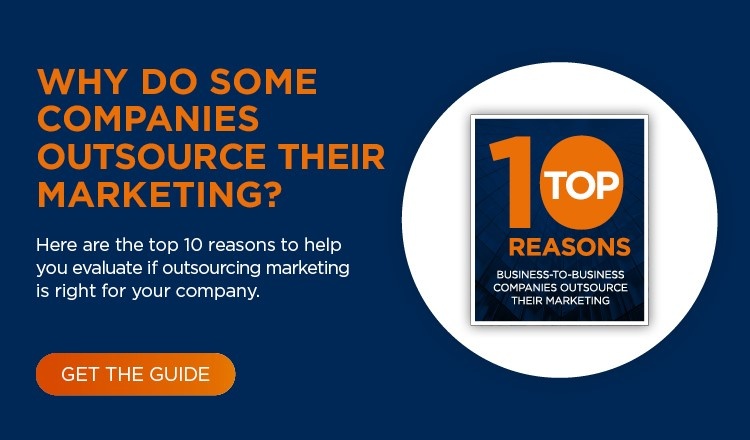B2B Marketing - to outsource or DIY? That is the question.

Debating whether or not you should outsource your B2B marketing? We've taken a closer look at the pros and cons associated with each option to help you decide if an outsourced marketing strategy is the right move for you.
DIY or outsourced, marketing is becoming a must for all businesses.
For B2B companies, marketing wasn't a priority in the past. But with globalization and vastly available information, buyers are much more knowledgeable than in the past. They have higher expectations. They're harder to reach. Going to trade shows and cold calling are passé. So how can your company acquire new customers?
Marketing is the new way to raise awareness and generate leads. But marketing is easier said than done for business-t0-business (B2B) companies. How can small and mid-sized B2B companies get great marketing?
There are two primary choices:
1. Create an internal marketing team
2. Outsource marketing to a third party
There are three major areas of the business to consider. Here's a Pro and Con comparison for each:
1. Talent and Expertise
In-house - Pros
Having a dedicated marketing team that knows the ins
and outs of your business  is a tremendous benefit. Over time, you can build a team that's perfectly aligned with your business objectives, engaged and invested in the organizations' outcomes. You also have control of 100% of their time, allowing for flexibility and added responsibilities.
is a tremendous benefit. Over time, you can build a team that's perfectly aligned with your business objectives, engaged and invested in the organizations' outcomes. You also have control of 100% of their time, allowing for flexibility and added responsibilities.
In-house - Cons:
Building a team from scratch is challenging. As a non-marketer, it may be difficult to identify the skill sets and experience needed in marketers. It means additional headcount, the risk and cost of hiring mistakes, and supervisor responsibilities. In addition, the marketing team will need to have constant
support in professional development and skill upgrades.
Outsourcing - Pros:
Typically a B2B marketing outsourcing company will bring ready skills and expertise in order to asses the marketing requirements needed to achieve your company's goals. They'll be able to provide the most appropriate team for your business from their talent pool. You get the best match for your business needs, without the hassle of recruitment.
Outsourcing - Cons:
A 3rd party will need time to learn your industry and company culture, which will take time. In addition, they likely won't spend 100% of their time on your business, which means they have to balance their time between your company and other organizations they work with. And because outsourcing companies are trying to balance the skill set and level they're providing, along with a cultural fit, it can be a tricky balancing act.
2. Fixed & Variable Costs
In-house - Pros:
With a dedicated team, organizations can adapt to sudden changes in market trends, client demands and opportunities. Fixed costs like people, technology and infrastructure can be effective investments, even if they require a large portion of the budget.
In-house - Cons:

Maintaining internal fixed marketing resources is pricey. Having full time staff at senior through junior skill levels is impractical for most businesses who spend less than $500,000 a year in marketing.
Outsourcing - Pros:
Outsourcing arrangements don't require a big upfront investment. Retainer agreements are variable
cost investments and the level of service can scale up or down based on business need. Engagements can sometimes be structured to include a pay-for-performance component, tying the outsourcer closer to your goals and results, making the cost directly correlated to the sales of your organization.
Outsourcing - Cons:
There is always a risk that the promised results are not delivered and the investment does not yield the required result. Written outsourcing agreements can mitigate that risk, there is always a chance the promised results are not delivered. On the flip side, it is easy to terminate such agreements with minimal impact to the business, unlike with an internal team.
3. ROI
In-house - Pros:
During times of expansion, marketing can be closely
tied to the glory of the company. Return on investment
is clear and marketers are the heroes. The investment
has paid off and the talent, process and technology have
contributed to a well-oiled marketing machine.
In-house - Cons:
When revenues fall short and profits suffer, organizations cut costs. The glory days are over and marketing investments are considered 'nice-to-have',not need-to-have. Cuts are hard on organizations but financially and emotionally.
Outsourcing - Pros
Outsourcing offers better flexibility and reduces the shock of boom and bust periods. Activity can be scaled up or down easily, reducing risks. Some outsourcing arrangements can be tied to performance so that risk is mitigated. The client’s happiness equals the outsourcer’s well-being, and deals can be made during difficult times.
Outsourcing - Cons
Even with a good agreement in place, outsourcers are not part of the company. Most agreements have an exit clause and when times get tough it can be too easy for both parties to terminate. The road to success is not always a straight line to the top and commitment is required to support that journey to success.
And the answer is:
The decision to outsource marketing or build it in-house can be both strategic and tactical. You'll want to consider whether it will be a valuable use of your resources to develop the competence internally, and how long that process will take. Every business is different.
.png?width=2361&height=488&name=Mezzanine%20Logo_Horiz_RGB_on%20blue%20(1).png)


